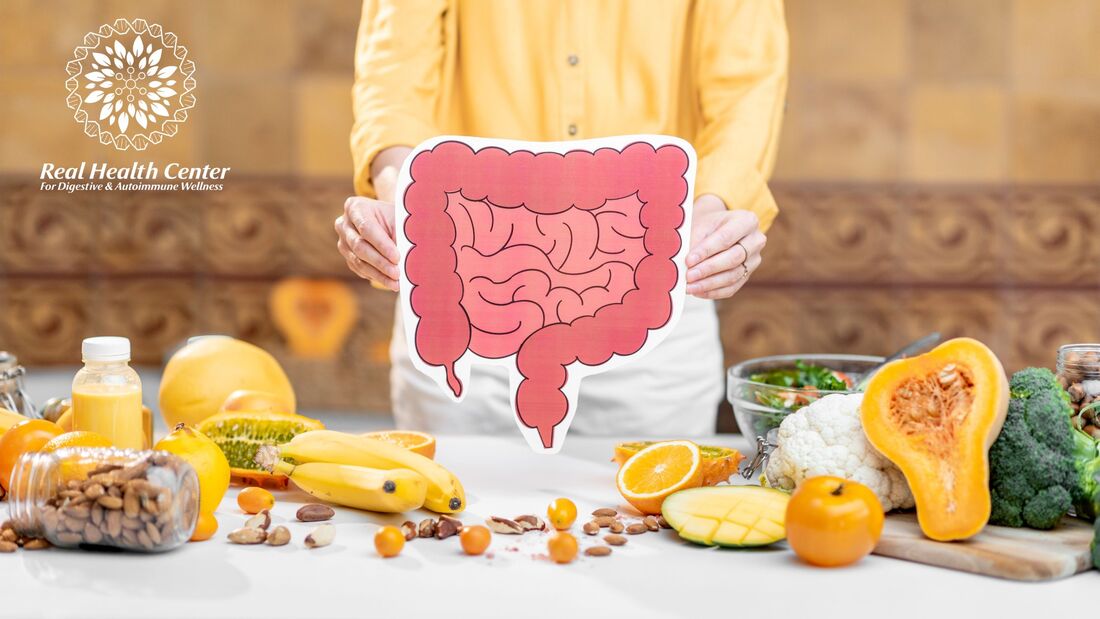The Gut-Body Symphony: Navigating the Intricate Connection Between Your Gut and Overall Health8/31/2023 Greetings to all those seeking a deeper understanding of holistic well-being! Today, we embark on an exploration of the wondrous and intricate connection that exists between your gut and the entire symphony of your body's functions. As a Certified Functional Medicine Practitioner and Functional Nutrition Counsellor, I am excited to guide you through the captivating realm of the gut-body connection.
A Microbial Tapestry: The Gut Microbiome Picture your gut as a thriving ecosystem bustling with life—a tapestry woven from trillions of microorganisms collectively known as the gut microbiome. This vibrant community of bacteria, yeasts, and other microbes plays a pivotal role in not only your digestive health but also your overall vitality. Beyond Digestion: A Multifaceted Influence While the gut's primary role is digesting and absorbing nutrients from the foods you consume, its influence extends far beyond the confines of the digestive process. The gut microbiome holds the key to several aspects of your well-being: 1. Immune Function: A significant portion of your immune system resides in the gut. The gut microbiome and immune system communicate in a dynamic dance, shaping the body's immune responses. A harmonious gut microbiome contributes to a robust immune defense against pathogens and harmful invaders. 2. Hormonal Balance: Surprisingly, your gut microbiome can influence hormonal balance. Microbes participate in metabolizing hormones like estrogen, impacting their levels and potentially influencing menstrual cycles, mood, and hormonal health. 3. Brain-Gut Axis: The gut-brain connection is a fascinating bridge between your gut and your central nervous system. This bidirectional communication influences mood, cognition, and mental well-being. The gut microbiome produces neurotransmitters and communicates with the brain through neural and hormonal pathways. 4. Nutrient Synthesis: Certain gut bacteria play a role in synthesizing vitamins and other nutrients, contributing to your overall nutrient status. 5. Metabolic Health: The gut microbiome can impact your metabolism, affecting how your body processes and stores energy. Imbalances in the microbiome have been linked to metabolic disorders like obesity and type 2 diabetes. 6. Inflammation Regulation: A harmonious gut microbiome can help regulate inflammation—a vital response that, when dysregulated, can lead to chronic health conditions. Nurturing the Gut-Body Harmony As you navigate the landscape of holistic health, nurturing the gut-body connection emerges as a cornerstone. Here's how you can promote a thriving gut microbiome and unlock its multifaceted benefits: 1. Fiber-Rich Diet: Embrace a diet rich in fiber from whole grains, fruits, vegetables, and legumes. Fiber nourishes beneficial gut bacteria and supports their growth. 2. Diverse Foods: Encourage microbial diversity by consuming a variety of plant-based foods. Each type of fiber feeds different groups of bacteria. 3. Probiotic Foods: Incorporate fermented foods like yogurt, kefir, sauerkraut, and kimchi to introduce beneficial bacteria into your gut. 4. Prebiotic Foods: Consume prebiotic-rich foods like garlic, onions, and bananas. These foods provide nourishment for your existing gut bacteria. 5. Hydration and Mindful Eating: Stay hydrated and practice mindful eating to support optimal digestion and nutrient absorption. 6. Stress Management: Chronic stress can impact the gut microbiome. Engage in stress-reducing activities such as meditation, yoga, and spending time in nature. 7. Professional Guidance: Collaborate with functional medicine practitioners to tailor a holistic plan that nurtures your gut and aligns with your unique health profile. In conclusion, the gut-body connection is a captivating journey of discovery that underscores the interplay between your gut microbiome and your overall well-being. By nurturing your gut, you're nurturing every facet of your health. As you navigate this path, know that I'm here to provide guidance, insights, and evidence-based strategies to help you unlock the potential of your gut for vibrant living. Your initial consultation is free and you can request it by clicking the button below:
0 Comments
Bacterial overgrowth in the small intestine can have broader implications for health beyond just digestive discomfort. This concept is rooted in the understanding that the gut microbiome plays a pivotal role in overall well-being, and disturbances in gut health can potentially impact various body systems. Here's an overview of the connection between digestive issues and other health conditions:
Gut-Body Connection: The gut microbiome, which includes various types of bacteria, can influence not only digestive health but also immune function, hormonal balance, and even mental well-being. Systemic Inflammation: Bacterial overgrowth in the small intestine can lead to increased inflammation in the gut. This localized inflammation can have systemic effects, potentially contributing to chronic inflammation throughout the body. Chronic inflammation is known to be a factor in a wide range of health conditions, including cardiovascular disease, autoimmune disorders, and metabolic syndrome. Immune System Modulation: The gut is a significant part of the body's immune system. An imbalance in gut bacteria can disrupt the delicate balance of the immune response, potentially leading to immune-related conditions and allergies. Bacterial overgrowth may negatively influence immune system function. Nutrient Absorption and Deficiencies: When the small intestine's ability to properly absorb nutrients is compromised due to bacterial overgrowth, it can lead to nutrient deficiencies. These deficiencies can affect various bodily functions, potentially contributing to health issues ranging from anemia to compromised bone health. Hormonal Imbalances: Gut health has been linked to hormonal regulation. An imbalanced gut microbiome can impact the production and metabolism of hormones, potentially contributing to hormonal imbalances that affect reproductive health, mood, and more. Neurological and Mental Health: The book also touches on the emerging field of the gut-brain connection. Disruptions in gut health, such as bacterial overgrowth, could influence neurotransmitter production and communication between the gut and the brain. This connection has implications for mental health conditions like anxiety and depression. Autoimmune Conditions: There’s a potential role of gut health in autoimmune diseases. While the exact mechanisms are complex and not fully understood, there is growing evidence suggesting that imbalances in gut bacteria may contribute to triggering or exacerbating autoimmune conditions. Metabolic Health: Disturbances in gut microbiota composition and function have been linked to metabolic disorders such as obesity and insulin resistance. Addressing gut health could potentially play a role in managing metabolic conditions. It's important to note that the connections between gut health and these various health conditions are areas of ongoing research, and the exact mechanisms involved are complex and multifaceted. The above points highlight these potential links to emphasize the importance of addressing bacterial overgrowth not only for digestive comfort but also for overall health and well-being. As a Certified Functional Medicine Practitioner and Functional Nutrition Counsellor, I inform and educate my clients about the broader implications of gut health and guide them toward approaches that promote a balanced gut microbiome. In my practice, I approach each client's health journey holistically and consider collaborating with other healthcare professionals when necessary. Your initial consultation is free and you can request it by clicking the button below: |
AuthorAyesha Syed, AFMC is a Certified Functional Medicine Practitioner and a Certified Functional Nutrition Counsellor. At the Real Health Center, she helps you manage Autoimmune Health and Digestive/GI Health applying functional medicine principles and testing if needed, nutritional counseling, lifestyle, and complementary therapies designed to support your overall health and balance. Archives
July 2024
Categories
All
|




 RSS Feed
RSS Feed

